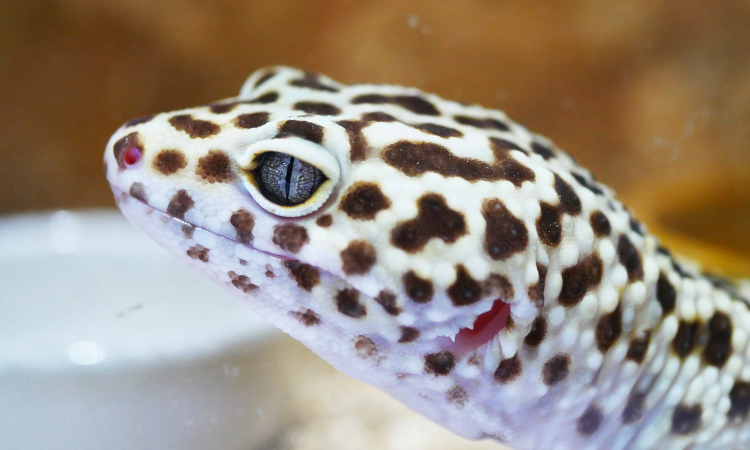If you own a leopard gecko, you may have noticed that your pet doesn’t seem to be eating as much as usual. You might be wondering if your leopard gecko is starving itself. While it is possible for leopard geckos to go through periods of reduced appetite, it’s important to make sure that your pet is getting the nutrition it needs. In this blog post, we’ll explore the causes of reduced appetite in leopard geckos and how to ensure that your pet stays healthy.

Leopard geckos are known to be finicky eaters
Leopard geckos are unique creatures – not only do they have unique spotted and striped patterns, but their eating habits are also out of the ordinary. These geckos can be described as finicky eaters due to their preference for a diet specifically composed of insects. While geckos can still survive on other types of food, for optimal health, it’s important to make sure that insects are included in their meals.
It’s essential to monitor what your gecko is eating and make sure that it’s getting all the necessary nutrients, especially because many geckos tend not to eat a wide range of good-for-them food items.
Having an understanding of the dietary needs of leopard geckos will ensure they remain healthy and thrive in their environment!
If your leopard gecko isn’t eating, it could be because of stress, illness, or a change in environment
One of the most common issues gecko owners have is that their geckos decide to stop eating. If this happens, it’s important to quickly assess why your gecko isn’t eating. Stress, illness, or a change in environment can all be possible culprits.
Geckos are highly sensitive creatures and even small changes can cause stress that affect their food intake. It is also possible for them to become sick and lose interest in feeding.
Regularly checking for signs of illness and ensuring your gecko is comfortable in its environment are key ways to ensure your gecko’s health and appetite.

Don’t worry if your leopard gecko skips a meal or two – they can go without food for up to two weeks
Leopard geckos often go without eating for a few days, and can tolerate not having food for up to two weeks. This is their natural adaptation to their environment, and even though geckos are small creatures, they are still well equipped to handle this period of fasting.
However, it is important that you provide your gecko with fresh food once they get hungry again: if meal time has been skipped too often then the gecko’s health could be compromised.
If you’re concerned about your leopard gecko’s health, take them to the vet for a check-up
Leopard geckos need the same type of care as other pets to stay healthy, so if you’re a gecko owner and are concerned about their wellbeing, make sure to take them in for regular check-ups at the veterinarian.
Not only can these visits be vital for diagnosing any potential health problems early on, but they provide an opportunity for geckos to receive vaccinations or maintenance treatments that help keep them strong and fit. It’s also a great chance to ask questions or discuss any anxieties you may have regarding their care, with professional guidance.
Taking your gecko to the vet for regularly scheduled check-ups is one of the most important steps you can take towards ensuring their long-term vitality and quality of life.

Try offering your leopard gecko different types of food to see what they’ll eat
Providing variety to your gecko’s diet is important, since geckos are such interesting creatures and their eating habits can reflect that. Variety not only keeps their diet interesting, but it also helps ensure they are getting the best nutrition possible from different sources.
Experimenting by offering them different types of food is a fun way to find out what kind of food your gecko enjoys most; it may surprise you what ends up being their favorite!
Additionally, being exposed to new foods encourages geckos to be bolder overall, which supports good mental health. So, don’t be afraid to try some new and exciting options – your gecko will thank you for it!
In conclusion, leopard geckos are unique and sometimes finicky eaters, so it’s totally normal for them to skip a meal or two. However, if your leopard gecko is refusing food for an extended period or showing other signs of illness, you should schedule a vet appointment.
Above all else, make sure that your pet has enough food and water, keep the environment low-stress and comfortable for them, and offer various types of food to ensure that your leopard gecko gets enough nutrition in their diet.
With patience and love from their owners, leopard geckos can have long, healthy lives full of eating adventures!
Related posts:

Hi – I’m Erika, the lead gecko enthusiast here at Geckopedia! I write articles about pet geckos, including what to feed your leopard gecko and how to help your pet gecko live a long, happy life! I graduated with advanced degrees from UC-Berkeley, the University of Southern California (USC) and Indiana University-Bloomington, where I studied Biology and Animal Science. I use my experience to help others learn about gecko care, and I am an advocate for all topics gecko related!
